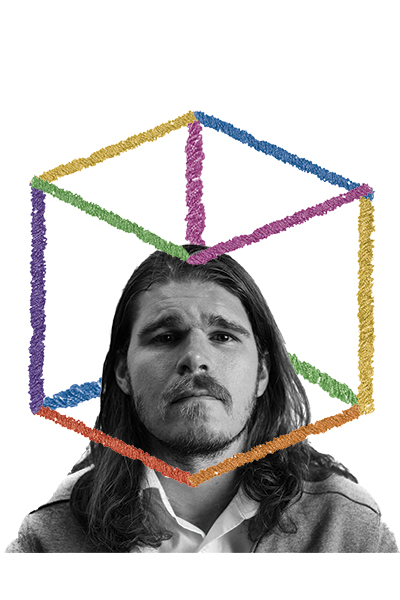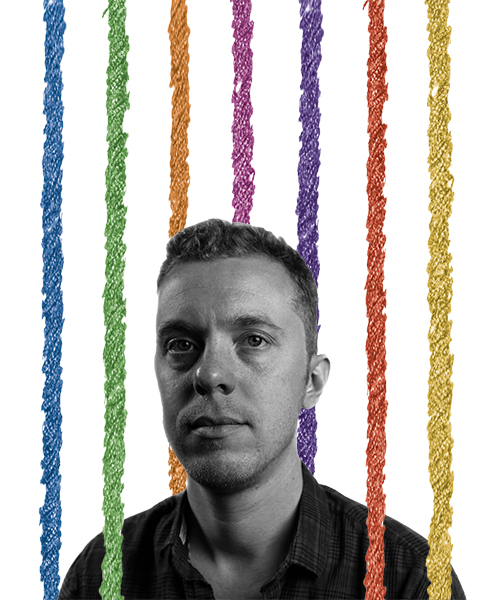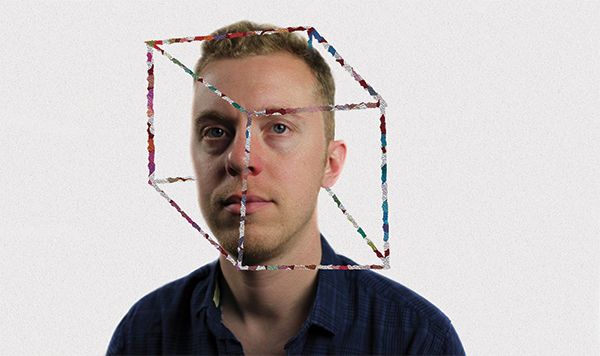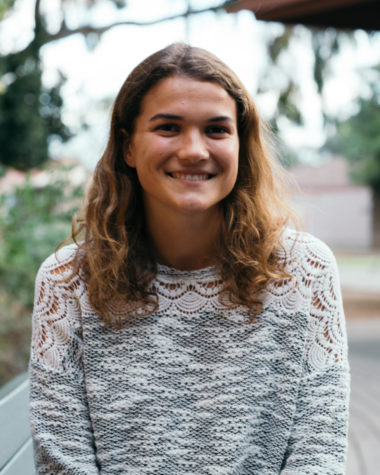TORN
Queer religious people are often expected to have similar tales of oppression. The real stories prove the diversity of their experiences.
June 4, 2017
“It was not all bad.”
That’s how Matt Perry describes what he says is the one thing he wants people to understand about his experience as a gay Mormon man. Although Perry in some ways represents a fairly unique perspective, his point of view, of course, isn’t a solitary one. That’s not to say the lives of queer religious people are free of conflict, but being both religious and queer doesn’t always mandate confessional booths, conversion therapy or Westboro Baptist protests. Others, however, have wrestled with the uneasy alliance between religion and sexuality for at least the last 2000 years.
Depending on one’s translation of the Bible, anything from “man lying with man” to “homosexuality” itself is condemned in Leviticus 20:13 as an abomination worthy of death. The Torah, containing this same passage, is cited similarly in condemnation of homosexuality. While interpretation of the Quran promotes much discussion, most Islamic scholars agree that sodomy is a major sin.
Looking only to direct interpretations, most of these texts clearly indicate a denunciation of homosexuality in some form. While many people turn to religion for moral guidance, that same quest for righteousness has historically evidenced motivation to persecute those whose actions or identities violate religious teachings. Historically speaking, some religious bodies have been persistent proponents of the oppression, shaming and torture of queer people. The Westboro Baptist Church, a Baptist church of Topeka, KS, is infamous for its expansive campaigns against gay people and consistent usage of the slogan “god hates fags.”
The reality, however, is that regardless of any supposed irreconcilability of religion and homosexuality, queer religious people do exist. Some spend a lifetime seeking this balance of seemingly contradictory identities, but this begs the question: Why is there an expectation for queer religious people to conform to any structure at all? These people have stories and experiences far more complex than most are exposed to. The truth is that there is no single story, whether of oppression or liberation, secrecy or advocacy, to surmise the life experiences of queer religious people. Here, C Magazine profiles four people whose stories shed light on the diversity of this topic.
Disclaimer: C Magazine would like to address our usage of the word “queer” throughout this story. We understand and fully acknowledge the word’s historically pejorative use and debated designation as a slur. However, certain contexts mandate use of an umbrella term and we found “queer” to be the most fitting due to the diversity of sexual orientations and labels found throughout this piece. We intend to make clear that our usage of the term is with solely respectful intentions.

At age 12, Matt Perry realized the truth behind his sexuality. “I didn’t really have a frame of reference to know what it was that was different or what that meant,” Perry said. “For the longest time I just thought that I was broken in my sexuality because I wasn’t attracted to girls and I was attracted to guys and that’s not how things are supposed to work.”
Perry reflects fondly on the traditions of the Mormon Church that largely impacted his upbringing: Going to church on Sundays, reading scripture every morning, participating in a Wednesday night youth group and spending time with his family practicing church lessons.
Once Perry realized what he was feeling, he went to his pastor for guidance. “That framed the issue for me from a very young age in terms of resisting temptation and doing what was right, what religion said to be right,” Perry said.
Perry spent his adolescence feeling ashamed because he did not fit into the “ideal” Mormon mold. When he sought advice, according to Perry, his pastor told him, “You’re a good kid, just try to keep that under control.”
Hearing that his feelings needed to be suppressed did not aid Perry’s situation. He did not know any gay people he could talk to, especially not ones who were also religious. Having someone with similar feelings would have helped him accept who he is earlier because he would have realized that his identity was not a source of shame.
“I think I would have had a much less painful childhood and adolescence if I had had more of a concept of being a variant of normal rather than broken,” Perry said. “There was not really any way to picture a future that I fit into. The only visions that I had of what could be would have required some pretty significant changes that were not in my power.”
At age 17, Perry looked past his fear of rejection and accepted that he was gay. Shortly after, he came out to his parents and began to trust others with his secret.
It wasn’t until he began college at Brigham Young University in Utah, a school affiliated with the Mormon Church, that Perry realized he did not agree with all of the lessons the church was teaching. For example, the church’s support for Proposition Eight, which prohibited same sex couples from getting married in California, repelled him from the philosophy of the church.
“To me, the way that the Mormon church was involved with Prop. Eight was clearly morally wrong,” Perry said. “There were arguments made that were logically unsound that the church supported wholeheartedly. The church is clearly wrong, and if the church is wrong about this, well, I guess everything is on the table now.”
The realization caused Perry to take a break from religious practices. However, after a few years he decided to return so that he could consider how impactful church was on his life and how truthful he believes its teachings are.
“Around the end of last year enough pieces clicked that I felt comfortable saying the answer is no, [religion] is not important for me and it’s not good for me,” Perry said. “So, I am preparing now, just taking care of some loose ends, [and then] I’m going to remove my name from the church records and officially not be a Mormon.”
Perry concluded that the way the church treated him and others who experienced similar oppression is irreconcilable. But he is also noticing slow, small changes occurring within the church to improve their acceptance of homosexuality. “They’re slowly changing where they can reconcile with their gay membership,” Perry said. “They have blown their chance for people who have come before. There is not any change yet, but they may be moving in that direction.”
Despite this, Perry does not resent growing up with Mormon values. “There was good stuff that came to me out of being raised a Mormon and having been a Mormon for most of my life up until to now,” Perry said. “For me at least, I want to make sure that the good parts don’t get left by the side of the road.”

Moving between North Carolina and Virginia, Jon Arnell spent his childhood never expecting to be able to come out. “I was quite aware I was [gay when] I was ten or 12, and I didn’t think I was going to tell anyone what I was experiencing,” Arnell said. “I kind of figured I was going to hide it forever.”
Later, he went to Brigham Young University and knew that at a religious school his sexuality was something he would not be able to express without facing non-acceptance from the community. In the rules of conduct of BYU, homosexual behavior is viewed as inappropriate and a violation to the Honor Code. Arnell was aware that he would have to get away from the school before he would be able to consider coming out in a safe environment.
Arnell needed more than just acceptance from the church; he was acutely aware of how those around him would react if he were to come out and was fearful for his reputation. “One thing that could’ve helped was if my parents could’ve have been more explicitly accepting,” Arnell said. “If my parents had told me very clearly that there was nothing I could do to make them reject me, that would’ve been a very big deal. My parents didn’t really say any of those things. This would have allowed me to come out earlier and be able to process easier.”
Despite his general disapproval of the Mormon Church, Arnell has been able to apply some of the religious ideas he’s been taught to his life as a gay man.
“There are a lot of principles taught in my religion that are very encouraging to a gay person,” Arnell said. “There are principles of self-love, self-acceptance and hope. There is a lot of talk about personal value and the importance of love, kindness and compassion.”
Although he grew up with these principles, it took him time to reconcile his identity and the teachings from youth. “I have always been aware of my own feelings and have been able to sort out and interpret them appropriately,” Arnell said. “So, during a time period full of influences around me that made me doubt my sexuality, I was still very conscious of what was inside.”
Having just moved to the Bay Area, Arnell felt that he was ready to share his secret. His new group of friends made him feel comfortable enough to come out, and he believes that the experience of coming out would have affected him differently had he done it in the southern culture of Virginia or North Carolina.
Despite the supportive community of the Bay Area, the difficulty of coming out was still present. “There’s not that much advice about how to be a Mormon and be gay,” Arnell said. “I have spent a lot time figuring what I was going to do, what I was going to take and what I was going to discard.”
The visibility of the LGBTQ community within the religion is not absent. There are organizations dedicated to helping the gay people within the Mormon church. Many people have also taken to social media to fight for the rights of LGBTQ Mormons.
“To be honest, queer people in Mormonism, right now, are very visible,” Arnell said. “We have several organizations dedicated to LGBTQ Mormons and get a lot of attention, especially on social media. There are little things that are happening.”
Even though Arnell did not think he could come out when he first started feeling changes in his identity, he is now happy with his decision to show people his true self. “I feel pretty settled with myself,” Arnell said. “The one part that feels continuously a little unsettled is interpersonal relationships; relationships with family and friends are still a little unsettled just because not everyone is quite on board. I just have to manage boundaries and keep my relationships as tight as possible given that I know who disagree with me. But for myself, I feel settled.”

Lina Landström was surrounded by religious influence during her upbringing in Sweden, yet she maintained distance from the Lutheran Church. “I didn’t go to church with my family and mostly stayed away from it,” she said.
However, as she grew older, Landström made the choice to begin attending a Lutheran church, following the example set by her friends. She actively participated in church events and classes, and was confirmed at age 14.
After coming out, Landström understood the consequences of the clash between religion and sexuality. While the Church did not deny her, they offered no outright acts of acceptance. “It [my sexual orientation] made me feel afraid of church and that’s why I stepped away for quite a while,” Landström said. “I didn’t know if they were going to reject me, but I was unsure they were going to welcome me either, so that fed into a ton of anxiety.”
As Landström grew older and moved to the United States, she sought to find a way to marry her two core identities. “I did seek out queer accepting churches, but it took many years for me to actually go to them,” Landström said. “I would’ve gone earlier if I hadn’t been so afraid.”
Even today, fear of non-acceptance dominates her everyday life. “I am still conscious of my fears when I hear a person is Christian, a pastor, or a church goer,” Landström said. “I remain wary and need to understand what kind of faith they have before I can fully trust them.”
From this fear, she has realized the challenges of being a queer person of faith. “It makes you feel very fragmented since you’re never really home within a religion, but you’re never really home in a queer community that is against religion, especially Christianity,” Landström said.
According to Landström, the relationship between religion and sexuality exchanges tensions, with fear and friction on behalf of both communities. “The queer community believes religion and being gay do not mix,” Landström said. “There is a lot of unawareness in the queer community, as well as a lot of fear and hurt. They think that all Christians and all people of faith will be hateful towards them. It’s not just resistance within religion, we also face resistance in the queer community.”
In the wake of President Trump’s election, Landström feels that an anti-religious sentiment has grown within liberal communities, sometimes spawning subtle accusations against religion in their activism. “While I think these protests are very important, and while I definitely do not agree with Trump, I think that a lot of protesters were lumping all Christians into one wing and listing them as an Evangelical group. [They were] hating on that instead of taking time to learn that the Christian religion is just as diverse as the queer community.”
Currently living in New York City, Landström is turning her experiences into actions by addressing the issues surrounding the identities of queer religious people. Landström could not tolerate the conflict separating her identities, and in a fit of frustration she created a Facebook group called “Queers of Faith.” The intent behind the group is not a radical plea for change, but rather a forum for love and support. “[The Facebook group] is trying to get people who identify the same way I do to come together and share their thoughts and struggles openly in a way that feels more whole,” Landström said. “While there are organizations for queer Christians, I felt like a place of community is what was lacking.”
Landström realized the initial impact of her group within a few months. “I think there is so much we can learn from one another,” Landström said. “I am currently trying to get in touch with the Muslim and Jewish communities here in New York to organize something together with them that is interfaith on the topic of LGBTQ questions. I think we share a lot of similar struggles and I think we can learn by working together.”
In a world where two strong circles have collided, Landström has been a driving force to break the barrier through awareness and acceptance. “Visibility [of queer people of faith] goes a long way in showing the LGBTQ community that there is such thing as open and affirming religion and not all religious people are going to hurt or reject them.”

Daniel Ross-Jones may not have always known he would work in religion, but those around him certainly did. “I would sing music from worship in the shopping cart as we did our weekly shopping,” Ross-Jones recounted.
Growing up in Grand Rapids, Minnesota, he didn’t know he was gay, either, until his senior year of high school. Within a couple of years, most people around him knew that, too. Except his grandmother — “she went to the grave without me ever having told her.”
Grand Rapids, a small, mostly Evangelical Lutheran town, was the backdrop for what Ross-Jones considers a fortunately sympathetic upbringing. He attributes some of this to the fact that his hometown was also the birthplace of Judy Garland, whose sizable gay following would often flock to the town as a sightseeing destination. “It was a town that had a lot of art and culture,” Ross-Jones said. “There was no real objectionable cultural conservatism at play in the same way as perhaps other small towns or areas. While that narrative may be increasingly common, it’s still far from universal. I’m really lucky because of the town I grew up in.”
The religious aspect of Ross-Jones’ childhood was characterized by his participation in two different churches — the one his family attended, he says, was “a really open, welcoming, warm congregation,” while the church he attended for Wednesday night gatherings embodied a conservative faith. However, Ross-Jones says it wasn’t the “hugely confrontational, adversarial, judgemental, hyper-aggressive, conservative Christianity” that he would encounter later in life. When he would later face adversity — death threats, for example, during his time as a university chaplain — in response to his identity, Ross-Jones says these childhood experiences helped him reach an understanding about the intentions of those who persecute him. “I want to give them the benefit of the doubt that they are emerging from a genuinely good place. I always go back to, ‘no, I actually do know people who hold these convictions, and it’s not that they’re bad people, they just disagree.’”
These beliefs help to explain how Ross-Jones has maintained a remarkable understanding of the prejudice he has faced. “I don’t think that I’ve experienced bitterness,” Ross-Jones said, “I think that I’ve experienced misunderstanding.” He’s decisively optimistic about what it will take to address these misunderstandings, too: “Let’s sit down and talk about it. That’s what I understand as a Christian minister is my call to ministry.”
Ross-Jones says that he’s never felt his identity was conflictual; the thought of any necessary reconciliation of religion and homosexuality didn’t cross his mind until long after both had taken root in his life. When he moved to the greater Minneapolis-St. Paul area following his eighth grade year, Ross-Jones had his first memorable run-ins with the vocalized prejudice he would continue to experience throughout his life. “I never heard ‘faggot,’ I never heard any derogatory language until we moved,” Ross-Jones said.
About a decade later, with a newly-minted degree in Communications from an Evangelical-Lutheran-affiliated university in Wisconsin, Ross-Jones accepted a job as the communications director for the regional Lutheran church body in southeastern Wisconsin. Though it wasn’t his intention at the time to pursue a job within the church body — “I was like, ‘ok, I’ll do that until I get my real job that I really want to do,’” he recalled — he’s been working in ministry ever since.
Ross-Jones was ordained as a minister of the United Church of Christ in 2011. He came to the decision to leave the Lutheran church, which he had grown up within, following a realization about his role within the anti-gay-ordination Lutheran Church as a gay man. “While I fit in that denomination, almost to a tee, in terms of what I believe and what I understand and what my understanding is of the trinity, my calling wasn’t to be the poster child exception to the rule.” Though the Lutheran church changed its anti-gay-ordination policy in 2009, Ross-Jones has continued his membership with the United Church of Christ and now works as an Associate Conference Minister for the United Church of Christ’s Northern California Nevada Conference.
An inevitable smile fills Ross-Jones’ face when he explains his recent work with the Bay Area branch of the Southern Baptist church. They’ve done what many churches have done before them: they’ve decided, after immense study, that the Bible presents no opposition to the ordination of gay ministers. The difference, however, lies in the fact that their generally conservative denomination prohibits the baptism, and therefore ordination, of gay individuals.
According to Ross-Jones, the church’s aim wasn’t to take a stance on gay ordination. The congregation simply felt that some of their gay community members were well equipped for leadership roles within the church. However, once members of the Southern Baptist Convention realized that the local church was not acting in alignment with the Southern Baptist Convention’s stance on LGBT issues, the Southern Baptist Convention promptly broke ties with the church.
Ross-Jones says that stories like this, of faith communities defying traditional systems of belief in order to further seek righteousness, represent the future of religion. “That challenge of presumption is part of how I’ve understood God at work in my own faith journey,” Ross-Jones said. “It changes the narrative. We are evolving to find more ways of widening those boundaries and more ways to push up against the human construct of grouping.”
Throughout recent years, there have been small and slow changes within the tensions of religion and sexuality. Anti-gay rhetoric by groups like the Westboro Baptist Church are more often receiving hate speech designations. Support groups for queer religious people are more common than ever, like Landström’s “Queers of Faith” Facebook group, or Affirmation, a resource for LGBT Mormons. There is more support available now than ever before, but that’s only part of the story.
Narratives on the experiences of queer religious people are uncommon. Those that do exist often paint the nature of these experiences into a singular box. These people are portrayed as unhappy with the circumstances or environments within which they were raised. There are people who are brutally abused, who are put down by degrading statements and who wish for nothing more than to be born into an accepting community. However there are also people who are grateful for the values they learned, the people they have met, and the encouragement from the uplifting messages that religious texts can send.
The experiences of queer religious people are far from identical. To project an inherent identity conflict, which for some is false, is to strip queer religious people of the ability to create their own narrative free of expectations.
It’s tough to say what the solution to this is — some say it’s to increase visibility of the stories of queer religious people, others say to continue to push for structural changes within the churches — but many, including Daniel Ross-Jones, have high hopes for the future.
“There are those who disagree in love, and there are those who don’t disagree in love,” Ross-Jones said. “And the same is true on the other side of the equation; there are those who are open and progressive and affirming in love, and those who do it militantly and aggressively in ways that are not helpful either. The way to break down those barriers is to have people who are willing to talk with one another.”

